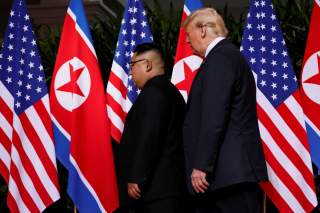The Hanoi Summit – We Asked Ankit Panda What Happens Next in U.S.-North Korea Relations
"Washington was wrong to walk away from Hanoi with no deal, assuming it was better than a deal that wouldn’t meet its ridiculously high standards for success. It’s time to enter a process of give-and-take with North Korea if this process is to survive."
Editor’s Note: Looking for more opinions on where we go after the Hanoi summit? Check out all 80 expert takes on where U.S-North Korea relations go next here.
I’ll keep this set of thoughts after the “no deal” U.S.-North Korea Hanoi summit simple. Why wasn’t there a deal?
Well, North Korea doesn’t have any intention of giving its nuclear weapons and it has told the world that several times. What it does have intentions of doing is offering up further measures to constrain and cap its output of fissile material should the United States agree to offer up sanctions relief. The United States wanted Kim Jong-un to give up his nuclear weapons—and possibly his biological and chemical weapons too, if certain top U.S. officials are to be taken seriously—in exchange for sanctions relief. That was a non-started and the summit failed.
In the days since Hanoi, we’re seeing what might be the beginning of the end for this process, which began with no fundamental basis of agreement between Washington and Pyongyang on the mere definition of terms as central as “denuclearization.” North Korea has reconstituted a satellite launch facility and a missile engine test site it had taken apart in 2018. A satellite launch of the sort that brought down the 2012 Leap Day agreement might be on the cards. At the same time, U.S. officials have doubled down on their maximalism. A senior administration official, one week after the collapse of the Hanoi summit, said that “nobody in the administration advocates a step-by-step approach.”
“In all cases, the expectation is a complete denuclearization of North Korea as a condition for all the other steps,” the official added. As long as that view steps, there’ll be no reason for North Korea to come back to the working-level to restate the offer it has privately and publicly conveyed to the United States. Washington was wrong to walk away from Hanoi with no deal, assuming it was better than a deal that wouldn’t meet its ridiculously high standards for success. It’s time to enter a process of give-and-take with North Korea if this process is to survive. Sadly, one week after Hanoi, its survival would require something of a miraculous shift in American temperament.
Ankit Panda is the senior editor at The Diplomat, where he writes daily on security, geopolitics, and economics in the Asia-Pacific region and hosts a popular podcast. His work has appeared in a range of publications across the world, including the New York Times, the Diplomat, the Atlantic, the Washington Quarterly, Al Jazeera, Politico Magazine, and War on the Rocks.
Image: Reuters

